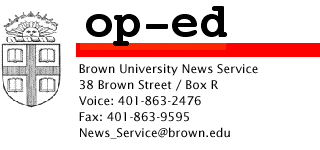Distributed June 18, 2003
Copyright ©2003 by Timothy Chambers
Op-Ed Editor: Mark Nickel
About 580 Words
Timothy Chambers
What academia means to me
Sometimes dropping a tiny piece of information into position allows the larger picture to snap into sharper focus. The hunt for that tiny piece of information and for the deeper understanding it makes possible is a major satisfaction of the academic life.
“Sure,” a friend once confided to me, “an academic’s life has its pleasantries. You don’t get your hands dirty. Your summers are free. You don’t have a boss breathing down your neck. But is that it? Is academic life more than just avoiding dirt, bosses and heavy-lifting?”
How to answer this earnest query? I could touch upon the love of learning or quenching a thirst for thinking. But these are just lazy generalities. “Make it concrete,” I urge my students, whenever their essays veer into the ether. “Examples help.” I would do well to obey my own advice.
In the winter of 2000, I was perusing Evan Thomas’ new biography, Robert Kennedy: His Life. The author recounted how, in the wake of John F. Kennedy’s assassination, the younger brother “was struggling with the good God of his childhood faith. On a yellow sheet found in his papers from about this time, he had scrawled, ‘The innocent suffer – how can that be possible and God be just?’”
The scene left me rapt. In a bare dozen words, Robert Kennedy had expressed theology’s holy grail – the Problem of Evil – with a poignancy worthy of Job.
But was the sentence of Kennedy’s making? His biographers believed so. By way of a source, Evan Thomas referenced Arthur M. Schlesinger’s authoritative tome, Robert Kennedy and His Times. Schlesinger, in turn, attributes Kennedy’s plea simply to “Handwritten Notes (1964), RFK Papers.” And there the bibliographic trail went cold.
Still, I had a detective’s hunch that there was more to the story. After all, Kennedy freely quoted Tennyson during his 85-day campaign for president (“Some men see things as they are, and ask Why – I dream of things that never were, and ask Why not?”). And in his famous extemporaneous remarks mourning the Rev. Martin Luther King Jr.’s passing, Kennedy recited Aeschylus from memory. I couldn’t put a finger on why, but I felt that Kennedy’s agonized query, likewise, echoed some text which had moved him.
Then, a clue. I read that shortly after Easter 1964, Kennedy plumbed a cache of texts authored by Bryn Mawr classicist Edith Hamilton. Could this idle-seeming fact solve the case?
Indeed. The culprit leaped out from Hamilton’s, The Greek Way, page 185: “In...God, [Aeschylus] holds, rests the final and reconciling truth of this mystery that is human life, which is undeserved suffering. The innocent suffer—how can that be and God be just? That is not only the central problem of tragedy, it is the greatest problem everywhere when men begin to think.”
It’s difficult to describe the thrill. Think, perhaps, of the small swell one feels penciling in a crossword puzzle’s final word. Or perhaps it’s more like the scientist’s satisfaction when her shrugging hunch is confirmed by Nature’s nod.
But the most heartening part was this: I now knew a nugget, however slight, that had almost died with Kennedy, but was now revived in my own mind. I alone knew the story behind the sentence scrawled on the darkest of spring days in 1964.
It’s moments like these that make the academic life a living one. It’s not an escape from the pedestrian drudges of the working world – it’s the pursuit and resurrection of knowledge which would otherwise vanish into the void. Or perhaps never exist at all.
It’s instants like these when the academic life exemplifies, in however small a manner, the large charge Kennedy would recite from Tennyson’s Ulysses: “To strive, to seek, to find, and not to yield.”





